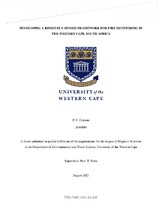| dc.contributor.advisor | Dube, Timothy | |
| dc.contributor.author | Graham, Earl Vincent | |
| dc.date.accessioned | 2021-08-16T10:05:49Z | |
| dc.date.available | 2021-08-16T10:05:49Z | |
| dc.date.issued | 2021 | |
| dc.identifier.uri | http://hdl.handle.net/11394/8334 | |
| dc.description | >Magister Scientiae - MSc | en_US |
| dc.description.abstract | For a long time, fire dynamics has been misunderstood and viewed as either a destructive force or an ecological necessity. The Western Cape Province in South Africa experiences the frequent occurrence of fires, due to the prevailing Mediterranean climatic conditions. This climate is known for its hot and dry summers and its cold and wet winters, which, along with the highly flammable indigenous flora of the Western Cape, provide suitable conditions for the occurrence of fires. However, the local environmental and ecological variables that influence the occurrence of fires and that could assist with fire management practices remain poorly understood. The development of an integrated operational monitoring framework is therefore imperative for detecting and mapping the occurrence of fires in the Western Cape, South Africa. | en_US |
| dc.language.iso | en | en_US |
| dc.publisher | University of Western Cape | en_US |
| dc.subject | Fire suitable conditions | en_US |
| dc.subject | Mediterranean | en_US |
| dc.subject | Moisture limited | en_US |
| dc.subject | Fuel load | en_US |
| dc.subject | Maxent | en_US |
| dc.title | Developing a remotely-sensed framework for fire monitoring in the Western Cape, South Africa | en_US |
| dc.rights.holder | University of Western Cape | en_US |

